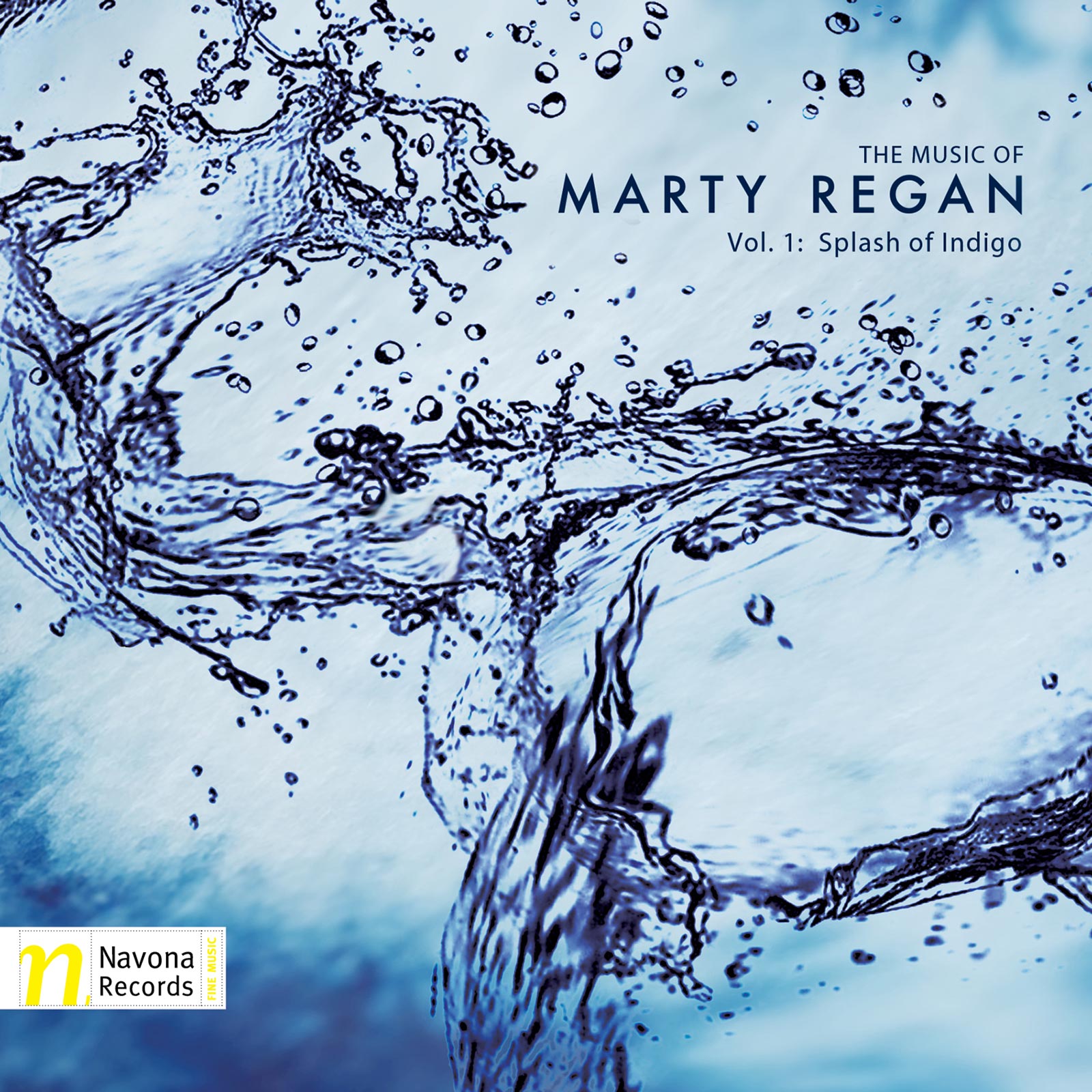
Share Album:
Splash of Indigo
Marty Regan composer
American composer Marty Regan specializes in composing music for traditional Japanese instruments, a fascination he has developed since 2000. Regan describes his Japanese-style compositions as, “hybrid musical soundscapes that reflect the age in which we live, an era based not necessarily on globalization, but of partnership based on global cultural interaction.” In contrast, SPLASH OF INDIGO features a complementary side of Regan’s output, containing only works for Western orchestral instruments and voice.
Despite the album’s instrumentation, Regan’s connection to Japan remains strong in SPLASH OF INDIGO. For example, Regan borrows from Japanese culture in a different way via the text of Three Poems by Tanikawa Shuntarō, while Splash of Indigo is based on idiomatic gestures and pitch collections found in Japanese folk music. Likewise, Regan’s solo piano composition Riding through Misty Clouds reconvenes with the naturalistic symbolic space he explores so thoroughly in his works for Japanese instruments, such as those featured on his earlier Navona releases FOREST WHISPERS (2010) and MAGIC MIRROR (2012).
As the latest addition to Regan’s growing catalog on the Navona label, SPLASH OF INDIGO offers a unique and valuable perspective on the full character of Regan’s music. Indeed, Regan’s works for traditional Japanese instruments tend to be understated and convey a subdued energy level. SPLASH OF INDIGO shows a different side of Regan’s aesthetic, like the explosive and post-minimalist personality of his rhythmically-driven orchestral work Overdrive. Even the more lyrical works on SPLASH OF INDIGO, such as Two Movements for Violin and Piano, are fundamentally different from Regan’s other music. Here, lyricism functions as a distinct space in the piece, and – particularly in the first movement of Two Movements for Violin and Piano – is placed against highly energized, rhythmic material to define the work’s structure.
Seen in the context of Regan’s career, the works on SPLASH OF INDIGO are most impressive in the range of musical forms they display. Perhaps drawing from Japanese musical aesthetics, constructing clearly defined musical forms are less of a concern in Regan’s compositions for traditional Japanese instruments. However, SPLASH OF INDIGO proves Regan is more than capable of inventing and developing charming and complex networks of musical ideas. In its varied collection of chamber and large ensemble works, SPLASH OF INDIGO shows Marty Regan is a composer of considerable breadth and skill beyond his dedicated efforts to build a bridge between American and Japanese musical culture.
Listen
Stream/Buy
Choose your platform
"A Splash of Indigo presents a strong argument for Regan's compositional range and his command of chamber and ensemble orchestration"
Track Listing & Credits
| # | Title | Composer | Performer | |
|---|---|---|---|---|
| 01 | Riding through Misty Clouds | Marty Regan | Brendan Kinsella, piano | 5:39 |
| 02 | Overdrive | Marty Regan | Moravian Philharmonic Orchestra | Petr Vronský, conductor | 6:44 |
| 03 | 2 Movements for Violin & Piano: I. half note = 52-60. Poco rubato | Marty Regan | Chloé Trevor, violin; Brendan Kinsella, piano | 9:16 |
| 04 | 2 Movements for Violin & Piano: II. quarter note = 112. Molto perpetuo | Marty Regan | Chloé Trevor, violin; Brendan Kinsella, piano | 9:01 |
| 05 | Runaway Train | Marty Regan | Trio Xia | Frederick Lau, flute; I-Bei Lin, violoncello; Tommy Yee, piano | 6:53 |
| 06 | 3 Poems by Tanikawa Shuntaro: No. 1. Kiss | Marty Regan | Julia Fox, soprano; Andrea Imhoff, piano | 12:45 |
| 07 | 3 Poems by Tanikawa Shuntaro: No. 2. Koro, koro | Marty Regan | Julia Fox, soprano; Andrea Imhoff, piano | 3:15 |
| 08 | 3 Poems by Tanikawa Shuntaro: No. 3. Haru | Marty Regan | Julia Fox, soprano; Andrea Imhoff, piano | 5:04 |
| 09 | Splash of Indigo | Marty Regan | Apollo Chamber Players | Matt Detrick, violin I; Anabel Ramirez, violin II; Whitney Bullock, viola; Matthew Dudzik, violoncello | 11:36 |
RIDING THROUGH MISTY CLOUDS / かすみ雲にのって (2012)
& Two Movements for Violin and Piano (2005)
recorded at Wire Road Studios in Houston, TX on August 15, 2015
recording session engineer/editing & mixing Andrew Bradley
OVERDRIVE (2005)
recorded March 1, 2016 at Reduta Hall in Olomouc, Czech Republic
recording session engineer Pavel Kuncar
recording session producer Vit Mužík
RUNAWAY TRAIN (2004)
recorded April 8, 2016 at Orvis Hall in Honolulu, HI
recording session engineer/editing & mixing Pierre Grill/Rende-Vous Recording
THREE POEMS BY TANIKAWA SHUNTARO / 俊太郎谷川の詩3編 (2002)
recorded May 12, 2015 at Wire Road Studios in Houston, TX
recording session engineer/editing & mixing Andrew Bradley
SPLASH OF INDIGO (2014)
recorded November 15, 2015 at Clarion Hall (Brazosport College) in Lake Jackson, TX
recording session engineer/editing & mixing Ryan Edwards & Shannon Smith/Coincident Sound
Producer Marty Regan
Funding for this recording was generously provided by the College of Liberal Arts Seed Grant Program (2016) and the Academy for the Visual and Performing Arts Research Enhancement Grant (2016) at Texas A&M University
Special thanks to Brendan Kinsella, the Moravian Philharmonic, Chloé Trevor, Trio Xia, Julia Fox, Andrea Imhoff, the Apollo Chamber Players, Andrew Bradley, Pierre Grill, Manami Miura, Paul Justin Charity, Kim Kattari and PARMA Recordings
Artwork and design Manami Miura
Composer portrait photography Paul Justin Charity
Proofreading Kim Kattari
All works © by Marty Regan, ASCAP
Executive Producer Bob Lord
Executive A&R Sam Renshaw
Audio Director Jeff LeRoy
Editing, Mixing & Mastering Shaun Michaud
Production Engineer Nate Hunter, Lucas Paquette
Art & Production Director Brett Picknell
Graphic Design Ryan Harrison
A&R Alex Bourne
Marketing Mike Mahn
Artist Information

Marty Regan
A composer of over 80 works for traditional Japanese instruments, Marty Regan is a Professor and Head of the Department of Performance Studies at Texas A&M University. Widely regarded as the authoritative source on the subject, his translation of Minoru Miki’s Composing for Japanese Instruments was published by the University of Rochester Press in 2008. His music has been broadcast on American Public Media’s Performance Today and NHK’s Hōgaku no hito toki/A Moment for Traditional Japanese Music. His chamber opera, titled The Memory Stone, was commissioned by the Houston Grand Opera as part of the HGOco's Songs of Houston: East + West initiative and was premiered in 2013 at the Asia Society Texas Center.
